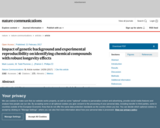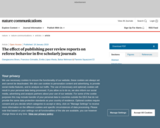
Limiting the debilitating consequences of ageing is a major medical challenge of our time. Robust pharmacological interventions that promote healthy ageing across diverse genetic backgrounds may engage conserved longevity pathways. Here we report results from the Caenorhabditis Intervention Testing Program in assessing longevity variation across 22 Caenorhabditis strains spanning 3 species, using multiple replicates collected across three independent laboratories. Reproducibility between test sites is high, whereas individual trial reproducibility is relatively low. Of ten pro-longevity chemicals tested, six significantly extend lifespan in at least one strain. Three reported dietary restriction mimetics are mainly effective across C. elegans strains, indicating species and strain-specific responses. In contrast, the amyloid dye ThioflavinT is both potent and robust across the strains. Our results highlight promising pharmacological leads and demonstrate the importance of assessing lifespans of discrete cohorts across repeat studies to capture biological variation in the search for reproducible ageing interventions.
- Subject:
- Biology
- Life Science
- Material Type:
- Reading
- Provider:
- Nature Communications
- Author:
- Anna B. Crist
- Anna C. Foulger
- Anna L. Coleman-Hulbert
- Brian Onken
- Carolina Ibanez-Ventoso
- Christina Chang
- Christine A. Sedore
- Daniel Edgar
- Dipa Bhaumik
- Elizabeth A. Chao
- Erik Johnson
- Esteban Chen
- Girish Harinath
- Gordon J. Lithgow
- Jailynn Harke
- Jason L Kish
- Jian Xue
- John H. Willis
- June Hope
- Kathleen J. Dumas
- Manish Chamoli
- Mark Lucanic
- Mary Anne Royal
- Max Guo
- Michael P. Presley
- Michelle K. Chen
- Monica Driscoll
- Patrick C. Phillips
- Shaunak Kamat
- Shobhna Patel
- Suzanne Angeli
- Suzhen Guo
- Theo Garrett
- W. Todd Plummer
- Date Added:
- 08/07/2020
